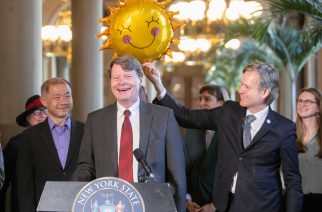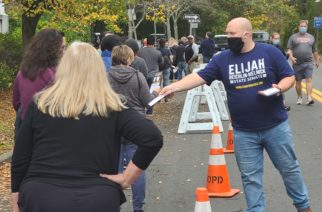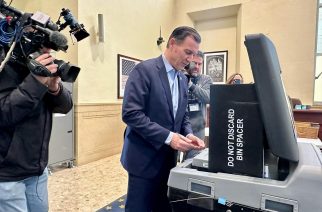
By a solid 64-to-21 percent, registered New York City voters say they prefer a millionaires’ tax instead of a form of congestion pricing as the best way to raise money for mass transit, according to a new Quinnipiac University poll.
The poll numbers come just days after a panel was convened by the governor to study ways to create a new funding stream for the city’s public transportation system while at the same time reducing car traffic on city streets and highways.
Multiple news reports say that Cuomo supports higher tolls for commuters entering Manhattan while New York City Mayor Bill de Blasio is pushing instead for a new tax on high-income earners to provide much-need funding for the city’s mass transit system.
The recent Quinnipiac poll shows that support for the millionaires’ tax option is strong in all five boroughs and among every listed party, gender, age and racial group.
Meanwhile, voters city-wide oppose (52-to-40 percent) a congestion pricing plan that would raise funds for mass transit by charging motorists a toll to enter midtown and downtown Manhattan, while reducing tolls on bridges that do not connect to Manhattan.
Not surprisingly, support for congestion pricing is 58-to-37 percent among Manhattan voters but is less popular in the outer boroughs.
Opposition to the new pricing plan stands at 53 percent in Brooklyn, 57 percent in Queens, 58 percent in the Bronx and 69 percent in Staten Island.
These same voters support (72-to-24 percent) increased taxes on people making more than $1 million a year as a way to bolster the city’s ailing public transportation system.
Support for a millionaire’s tax ranges from 67-to-28 percent in Brooklyn to 76-to-19 percent in Queens.
Republicans are divided with 48 percent supporting a millionaires’ tax and 50 percent opposed. Every other group supports the idea by wide margins.
Gov. Andrew Cuomo last week appointed a 16-member “Fix NYC” advisory panel to develop proposals to alleviate heavy congestion on New York City roads and highways while producing a dedicated funding stream for the MTA.
The panel will report findings in December of 2017 for consideration in next year’s legislative session.
A total of 28 percent of voters polled by Quinnipiac rate the quality of New York City subway service as “excellent” or “good,” while 64 percent rate it “not so good” or “poor.” Only 2 percent of those surveyed called the subway system “excellent.”
The best rating is among Manhattan voters — with 5 percent of them calling the quality of subway service “excellent” and 30 percent calling it “good.” The lowest score is among Queens voters – less than 1 percent say it is “excellent” and 20 percent say it is “good.”
“Millionaires are more likely riding to work in Escalades or Town Cars than on the Number 6 train, but New York City voters say that’s all the more reason they should pony up funding to make commuting easier for the rest of us,” said Tim Malloy, assistant director of the Quinnipiac University Poll.
“No matter what borough you board in, the subway is a rough ride. Manhattan strap hangers are the least vocal complainers, but in Queens — fuhgeddaboutit.”
Among New York City voters who say subway service is “not so good” or “poor,” 37 percent blame Gov. Andrew Cuomo more and 31 percent blame Mayor Bill de Blasio. Another 9 percent blame both leaders and 10 percent blame neither.
In the last year, 34 percent of voters say they have switched from the subway to another form of transportation. Today, 48 percent of voters say they take the subway to work.
From September 27 to October 4, Quinnipiac University surveyed 822 New York City registered voters with a margin of error of 4.4 percentage points. Live interviewers call landlines and cell phones.









